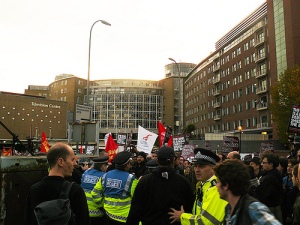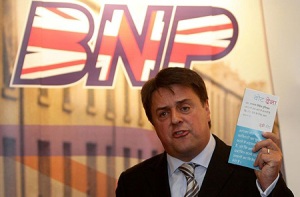Our comrade in the Republican Communist Network saw the BNP fail to infiltrate an anti-rapist demonstration in Midlothian
Nick Griffin and 5 others i.e. his driver and minders turned up outside Dalkeith Country Park after cancelling their planned rally in Glasgow earlier that day. Their stated aim was to support an intended rally against the presence of, convicted rapist, Robert Greens in our community. It was good that there was little spontaneous support for the BNP despite a lot of media coverage e.g. in The Sun newspaper. There was little visible presence from BNP supporters, one demonstrator counted 17, I thought there were less, but it was hard to tell, all were driven in by car. The BNP website promised 50 Nationalists would turn up and they urged other British nationalists to join them.
The BNP presence was opposed by the majority of the anti-rapist protesters plus about 30-40 local anti-fascists who had been alerted via Midlothian Trades Council. There were groups from Palestinian Solidarity, Unite Against Fascism, current and ex SSP members, trade unionists representing, Unison, EIS, UCATT, and UCU, the local FE college, independent socialists, two members of Socialist Appeal and at least one other Labour Party member. There was no identifiable SNP presence but, we did receive a message from local SNP MSP Colin Beattie supporting Midlothian Trades Council stance, saying there was no place for BNP in Midlothian and that he would have liked to have been there to show his support but had a previous appointment. In the event no councillors, MSPs or our MP were present. Continue reading “bnp humiliated in dalkeith”








